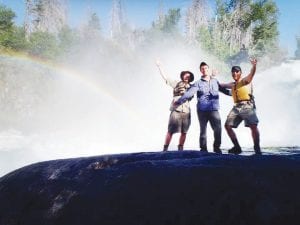Pictured on their last great canoe adventure with water and rainbows behind them are (L-R) Adam Maxwell, Jake Bendel and Ryan Ritter. The adventurers celebrated the beauty surrounding them. The threesome will be joined by three others on their next two-month long canoe trip into the Canadian wilderness. Bendel and Maxwell are former employees of Voyageur Canoe Outfitters.

For the second time in two years Adam Maxwell, Jake Bendel and Ryan Ritter will be on the water for a long canoe trip, this time spending 55 days in the Canadian wilderness as they portage and paddle eight rivers while covering 920 miles.
Maxwell and Bendel are former employees of Voyageur Canoe Outfitters (VCO) at the end of the Trail. In 2012 the two young men joined with Ritter and spent 87 days traveling 1,800 miles from Jasper, Alberta, Canada to the Hudson Bay in Churchill, Manitoba.
On this trip Teresa Olson, Alex Compton, and Kari Smerud will join the trio of experienced adventures. The six know each other because they have attended University of Minnesota Duluth (UMD) or worked together at summer camps.
With no place to restock, the crew will carry food with them, said Maxwell. They plan on eating wild rice, beans, granola, oatmeal, dehydrated apples, trail mix and beef jerky, as well as some fish they may be able to purchase or catch along the way.
The six-person crew will leave from Duluth on June 18 and drive to Waterbury Lake in northern Saskatchewan. The drive is long, between 28 and 34 hours, and with any luck the group will hit the water in three canoes on June 20.
Starting on Waterfound River, the crew will paddle eight rivers north, including Fond Du Lac, Chipman, Dubawant, Kamilukuak, Nowleye, Kazan, Ferguson and Wilson to Hudson Bay.
The longest stretch of water will be the 229-mile length of Dubawant River. The shortest paddle will be on the Wilson, a scant 18 miles before spilling into Whales Cove, Hudson Bay.
For Maxwell, this will be his third summer long paddle. In 2011 he joined three others—two others like himself VCO employees— who traveled from the north of the Pigeon River to York Factory on Hudson Bay, a trip sponsored by Voyageur Canoe Outfitters in honor of its 50th anniversary.
“The first long canoe trip I did was a 77-day trip which was motivated by the book Canoeing with the Cree. After that first trip I fell in love with the Canadian River travel and hope to paddle as many of them as possible,” said Maxwell.
With safety an issue, the crew will carry a personal location beacon to signal for help if they need to, and a satellite phone to call for help or to check on the weather. They will also carry flares and a couple of guns to ward off any angry polar bears if the need arises.
Each member of the expedition will need $2,600 for the trip. Most of the money will go for transportation; food costs will run each person $7 to $10 per day.
The route is so remote they don’t expect to see anyone for 20 days or more, and the longest portage is 4 miles long. Food will be carried in 11 bright orange Duluth packs.
In the beginning the group will paddle and portage rivers and lakes sheltered in Saskatchewan’s green boreal forests but by the end they will be in the cold barren arctic lands of Nunavut.
But it is in those lands that Maxwell had his best day ever on a trip.
“During the last night I spent on the Churchill River I was on polar bear watch (staying awake and guarding camp) while the Northern Lights flashed overhead. Before sunrise I began to cook breakfast and we were in the water just before the sun peeked over the horizon. As we paddled closer to Hudson Bay we were surrounded by trumpeter swans, seals and eventually beluga whales. We were followed by hundreds of whales as we paddled the last 5 miles of our 1,870 mile journey. The whole day was beautiful and unforgettable.”
Besides great adventure, Maxwell and his crew hope to accomplish several notable goals. One is to show nature at its most rugged and wild state, but another is to show what can happen when man encroaches too carelessly.
“Some rivers are polluted. One example is the Athabasca River in Alberta, which is severely impacted by tar sand mining. The lower part of the river was once a vital route to the tundra but now is a wasteland.
“The worst impacts are on native people which depend on the river for food and drinking water. Exploration for gold, uranium and other minerals also threaten many rivers in the north,” Maxwell said.
Maxwell said he and his partners “want to educate people about wilderness and the importance of preserving it, and to inspire more young people to paddle.
“As we travel on this adventure we want to engage in both wilderness and cultural experiences. We aim to share our adventure through presentations, blog posts, social media and our web page.”


Leave a Reply